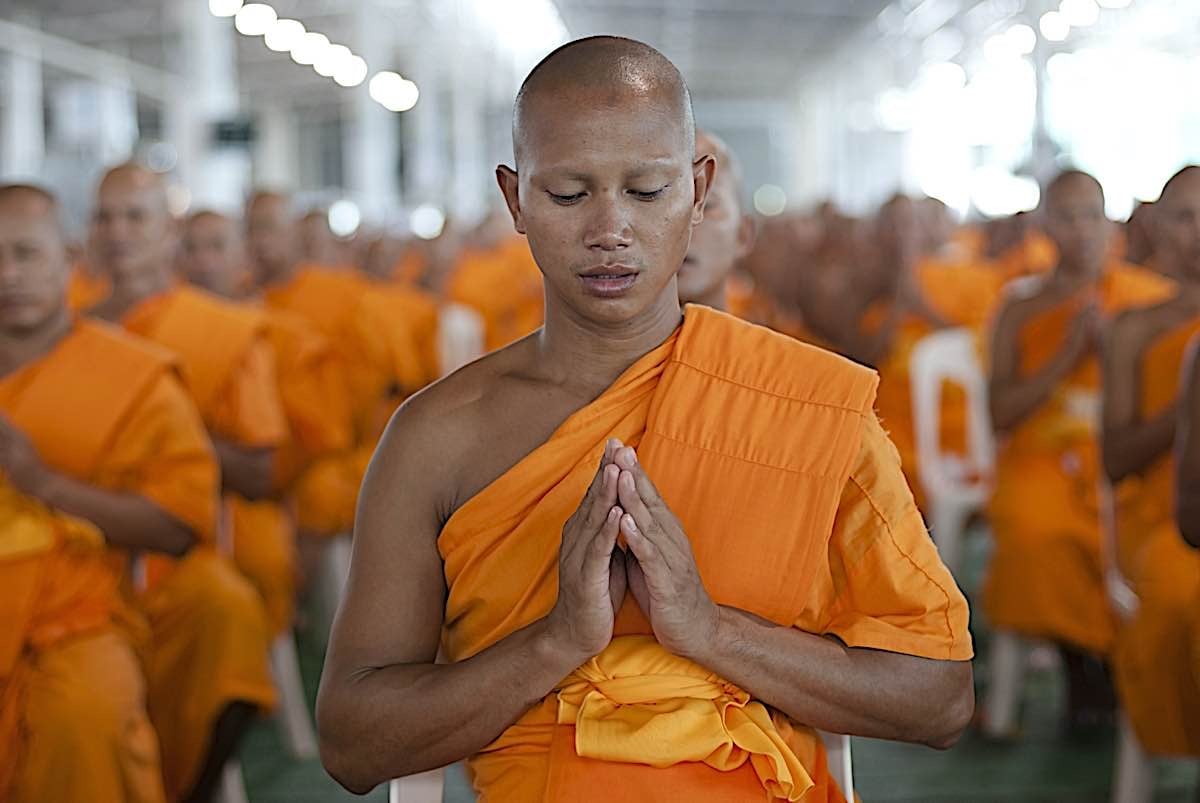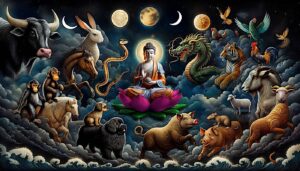“When the mind is undefiled, a happy destination”—Buddha; the 16 Defilements of the Mind, and the Simile of the Cloth: Vitthupama Sutta
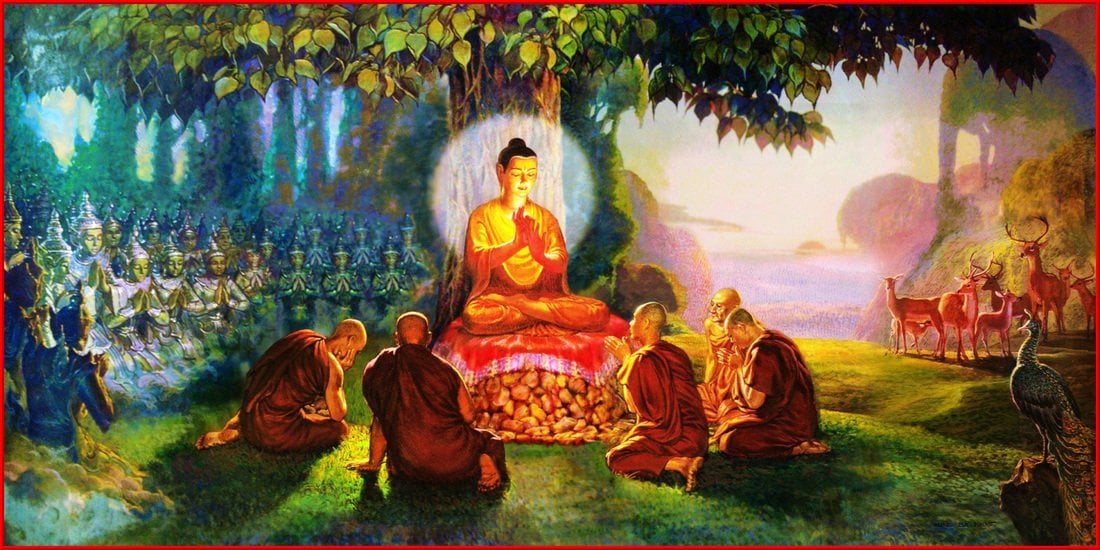
Purification of mind is a critical practice in all schools and lineages of Buddhism. In the Vatthupama Sutta [full translation in English below] Buddha explains the concept with the simile of the stained cloth:
“Monks, suppose a cloth were clean and bright, and a dyer dipped it in some dye or other, whether blue or yellow or red or pink, it would take the dye well and be pure in color. And why is that? Because the cloth was clean. So too, monks, when the mind is undefiled, a happy destination [in a future existence] may be expected…”
In this important sutta, Buddha explains the 16 defilements of the mind to be purified or remedied. It is notable that “greed” came first on a list of 16 defilements. Why is that? Generally, it is taught that “greed arises first” and that most defilements arise from some form of attachment or greed (abhijjha-visama-lobha).
Although only 16 are listed in this sutta, this is not meant to be a total list. All defilements are included. The 16 are:
1. abhijjha-visama-lobha, covetousness and unrighteous greed
2. byapada, ill will
3. kodha, anger
4. upanaha, hostility or malice
5. makkha, denigration or detraction; contempt
6. palasa, domineering or presumption
7. issa, envy
8. macchariya, jealousy, or avarice; selfishness
9. maya, hypocrisy or deceit
10. satheyya, fraud
11. thambha, obstinacy, obduracy
12. sarambha, presumption or rivalry; impetuosity
13. mana, conceit
14. atimana, arrogance, haughtiness
15. mada, vanity or pride
16. pamada, negligence or heedlessness; in social behavior, this leads to lack of consideration.
Remedies
Ultimately, the Eightfold Path [More on this here>>] is the remedy to the defilements — defilements are the causes of suffering — although there are suttas covering each of the 16. In this sutra, what are the remedies? As explained in sutta, here referring specifically to greed:
“Knowing covetousness and unrighteous greed to be a defilement of the mind, the monk abandons them.”
Aside from refraining, some Buddhist methods also include “transformation” — for example, the transformation of desire or anger, a Vajrayana practice. The practice in Mahayana of the Five Buddhas [Feature on the Five Buddhas] is focused on “transformations” of the Five Poisons, which are: anger, attachment, pride, jealousy, and ignorance.
Most remedies include elements such as:
- Regret
- Faith or complete confidence
- Right conduct
Full English translation of the Sutta:
Vatthupama Sutta
The Simile of the Cloth
1. Thus have I heard. Once the Blessed One was staying at Savatthi, in Jeta’s Grove, Anathapindika’s monastery. There he addressed the monks thus: “Monks.” — “Venerable sir,” they replied. The Blessed One said this:
2. “Monks, suppose a cloth were stained and dirty, and a dyer dipped it in some dye or other, whether blue or yellow or red or pink, it would take the dye badly and be impure in color. And why is that? Because the cloth was not clean. So too, monks, when the mind is defiled, an unhappy destination [in a future existence] may be expected.
“Monks, suppose a cloth were clean and bright, and a dyer dipped it in some dye or other, whether blue or yellow or red or pink, it would take the dye well and be pure in color. And why is that? Because the cloth was clean. So too, monks, when the mind is undefiled, a happy destination [in a future existence] may be expected.
3. “And what, monks, are the defilements of the mind? (1) Covetousness and unrighteous greed are a defilement of the mind; (2) ill will is a defilement of the mind; (3) anger is a defilement of the mind; (4) hostility…(5) denigration…(6) domineering…(7) envy…(8) jealousy…(9) hypocrisy…(10) fraud…(11) obstinacy…(12) presumption…(13) conceit…(14) arrogance…(15) vanity…(16) negligence is a defilement of the mind.
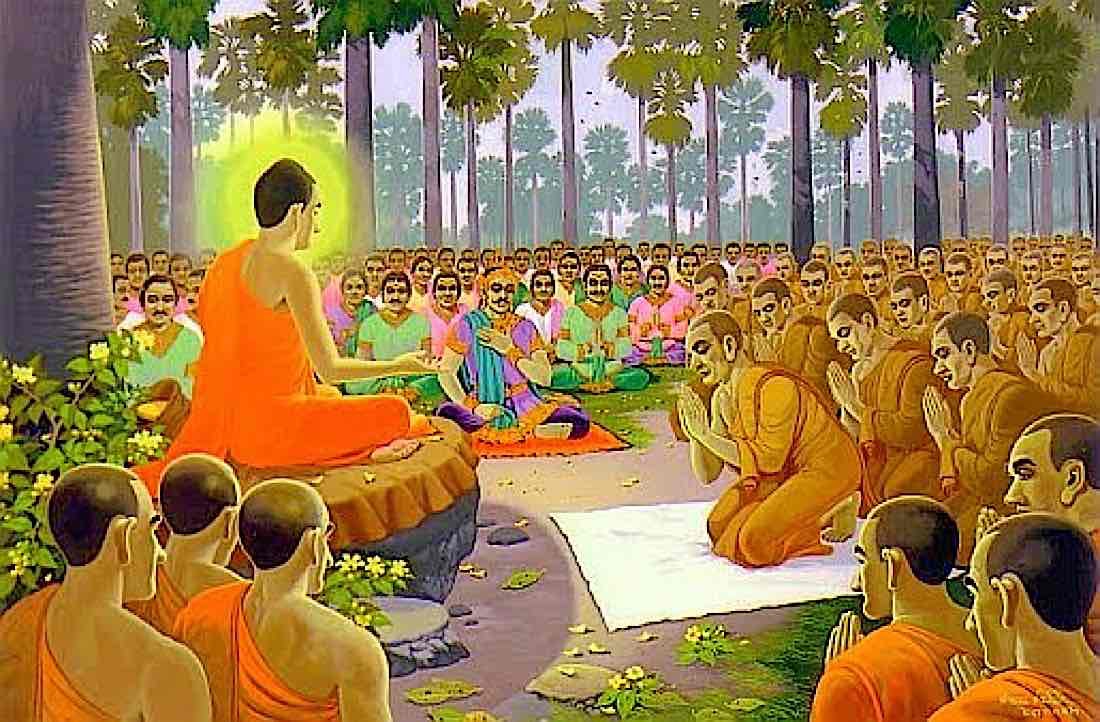
4. “Knowing, monks, covetousness and unrighteous greed to be a defilement of the mind, the monk abandons them.[4] Knowing ill will to be a defilement of the mind, he abandons it. Knowing anger to be a defilement of the mind, he abandons it. Knowing hostility to be a defilement of the mind, he abandons it. Knowing denigration to be a defilement of the mind, he abandons it. Knowing domineering to be a defilement of the mind, he abandons it. Knowing envy to be a defilement of the mind, he abandons it. Knowing jealousy to be a defilement of the mind, he abandons it. Knowing hypocrisy to be a defilement of the mind, he abandons it. Knowing fraud to be a defilement of the mind, he abandons it. Knowing obstinacy to be a defilement of the mind, he abandons it. Knowing presumption to be a defilement of the mind, he abandons it. Knowing conceit to be a defilement of the mind, he abandons it. Knowing arrogance to be a defilement of the mind, he abandons it. Knowing vanity to be a defilement of the mind, he abandons it. Knowing negligence to be a defilement of the mind, he abandons it.
5. “When in the monk who thus knows that covetousness and unrighteous greed are a defilement of the mind, this covetousness and unrighteous greed have been abandoned; when in him who thus knows that ill will is a defilement of the mind, this ill will has been abandoned;…when in him who thus knows that negligence is a defilement of the mind, this negligence has been abandoned —
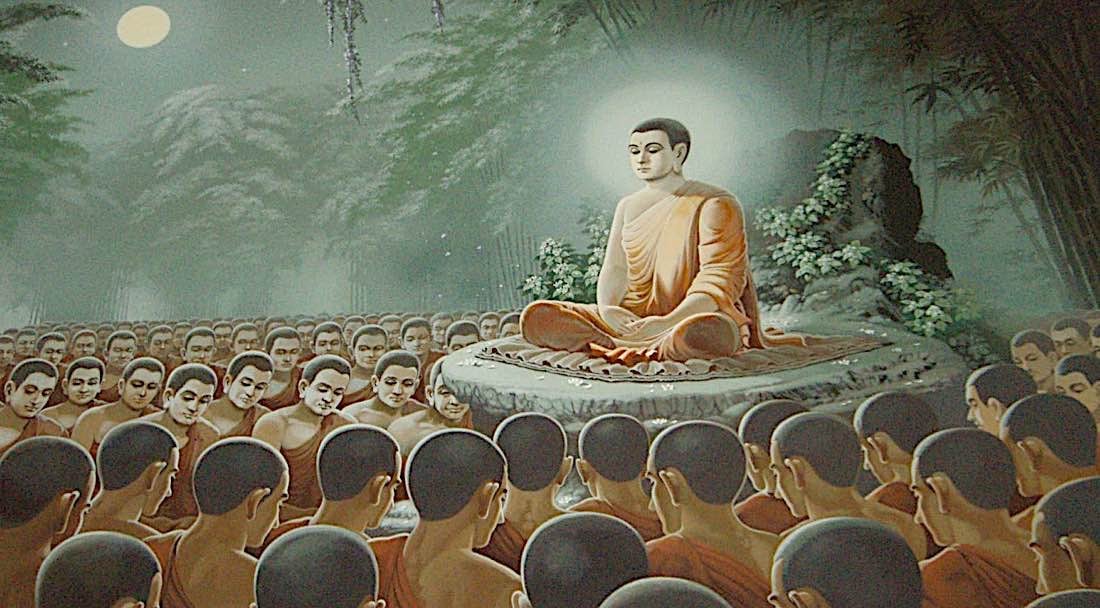
6. — he thereupon gains unwavering confidence in the Buddha [6] thus: ‘Thus indeed is the Blessed One: he is accomplished, fully enlightened, endowed with clear vision and virtuous conduct, sublime, knower of the worlds, the incomparable guide of men who are tractable, the teacher of gods and men, enlightened and blessed.’
7. — he gains unwavering confidence in the Dhamma thus: ‘Well proclaimed by the Blessed One is the Dhamma, realizable here and now, possessed of immediate result, bidding you come and see, accessible and knowable individually by the wise.
8. — he gains unwavering confidence in the Sangha thus: ‘The Sangha of the Blessed One’s disciples has entered on the good way, has entered on the straight way, has entered on the true way, has entered on the proper way; that is to say, the four pairs of men, the eight types of persons; this Sangha of the Blessed One’s disciples is worthy of gifts, worthy of hospitality, worthy of offerings, worthy of reverential salutation, the incomparable field of merit for the world.’
9. “When he has given up, renounced, let go, abandoned and relinquished the defilements in part,[7] he knows: ‘I am endowed with unwavering confidence in the Buddha…in the Dhamma…in the Sangha; and he gains enthusiasm for the goal, gains enthusiasm for the Dhamma, gains gladness connected with the Dhamma. When he is gladdened, joy is born in him; being joyous in mind, his body becomes tranquil; his body being tranquil, he feels happiness; and the mind of him who is happy becomes concentrated.
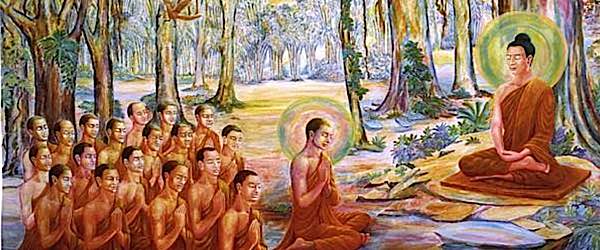
10. “He knows: ‘I have given up, renounced, let go, abandoned and relinquished the defilements in part’; and he gains enthusiasm for the goal, gains enthusiasm for the Dhamma, gains gladness connected with the Dhamma. When he is gladdened, joy is born in him; being joyous in mind, his body becomes tranquil; when his body is tranquil, he feels happiness; and the mind of him who is happy becomes concentrated.
11. “If, monks, a monk of such virtue, such concentration and such wisdom eats alms-food consisting of choice hill-rice together with various sauces and curries, even that will be no obstacle for him.
“Just as cloth that is stained and dirty becomes clean and bright with the help of pure water, or just as gold becomes clean and bright with the help of a furnace, so too, if a monk of such virtue, such concentration and such wisdom eats alms-food consisting of choice hill-rice together with various sauces and curries, even that will be no obstacle for him.
12. “He abides, having suffused with a mind of loving-kindness one direction of the world, likewise the second, likewise the third, likewise the fourth, and so above, below, around and everywhere, and to all as to himself; he abides suffusing the entire universe with loving-kindness, with a mind grown great, lofty, boundless and free from enmity and ill will.
“He abides, having suffused with a mind of compassion…of sympathetic joy…of equanimity one direction of the world, likewise the second, likewise the third, likewise the fourth, and so above, below, around and everywhere, and to all as to himself; he abides suffusing the entire universe with equanimity, with a mind grown great, lofty, boundless and free from enmity and ill will.
13. “He understands what exists, what is low, what is excellent,[13] and what escape there is from this whole field of perception.
14. “When he knows and sees in this way, his mind becomes liberated from the canker of sensual desire, liberated from the canker of becoming, liberated from the canker of ignorance. When liberated, there is knowledge: ‘It is liberated’; and he knows: ‘Birth is exhausted, the life of purity has been lived, the task is done, there is no more of this to come.’ Such a monk is called ‘one bathed with the inner bathing.”
15. Now at that time the Brahmin Sundarika Bharadvaja [18] was seated not far from the Blessed One, and he spoke to the Blessed One thus: “But does Master Gotama go to the Bahuka River to bathe?”
“What good, Brahmin, is the Bahuka River? What can the Bahuka River do?”
“Truly, Master Gotama, many people believe that the Bahuka River gives purification, many people believe that the Bahuka River gives merit. For in the Bahuka River many people wash away the evil deeds they have done.”
16. Then the Blessed One addressed the Brahmin Sundarika Bharadvaja in these stanzas:[19]
Bahuka and Adhikakka,
Gaya and Sundarika,
Payaga and Sarassati,
And the stream Bahumati —
A fool may there forever bathe, Yet will not purify his black deeds.
What can Sundarika bring to pass? What can the Payaga and the Bahuka? They cannot purify an evil-doer,
A man performing brutal and cruel acts.
One pure in heart has evermore
The Feast of Cleansing and the Holy Day;
One pure in heart who does good deeds Has his observances perfect for all times.
It is here, O Brahmin, that you should bathe To make yourself a safe refuge for all beings. And if you speak no untruth,
Nor work any harm for breathing things,
Nor take what is not offered,
With faith and with no avarice,
To Gaya gone, what would it do for you? Let any well your Gaya be!
17. When this was said, the Brahmin Sundarika Bharadvaja spoke thus:
“Magnificent, Master Gotama! Magnificent, Master Gotama! The Dhamma has been made clear in many ways by Master Gotama, as though he were righting the overthrown, revealing the hidden, showing the way to one who is lost, or holding up a lamp in the dark for those with eyesight to see forms.
18. “I go to Master Gotama for refuge, and to the Dhamma, and to the Sangha. May I receive the first ordination of going forth under Master Gotama, may I receive the full admission!
19. And the Brahmin Sundarika Bharadvaja received the first ordination of going forth under the Blessed One, and he received the full admission. And not long after his full admission, dwelling alone, secluded, diligent, ardent and resolute, the venerable Bharadvaja by his own realization understood and attained in this very life that supreme goal of the pure life, for which men of good family go forth from home life into homelessness. And he had direct knowledge thus: “Birth is exhausted, the pure life has been lived, the task is done, there is no more of this to come.”
And the venerable Bharadvaja became one of the Arhats.
More articles by this author
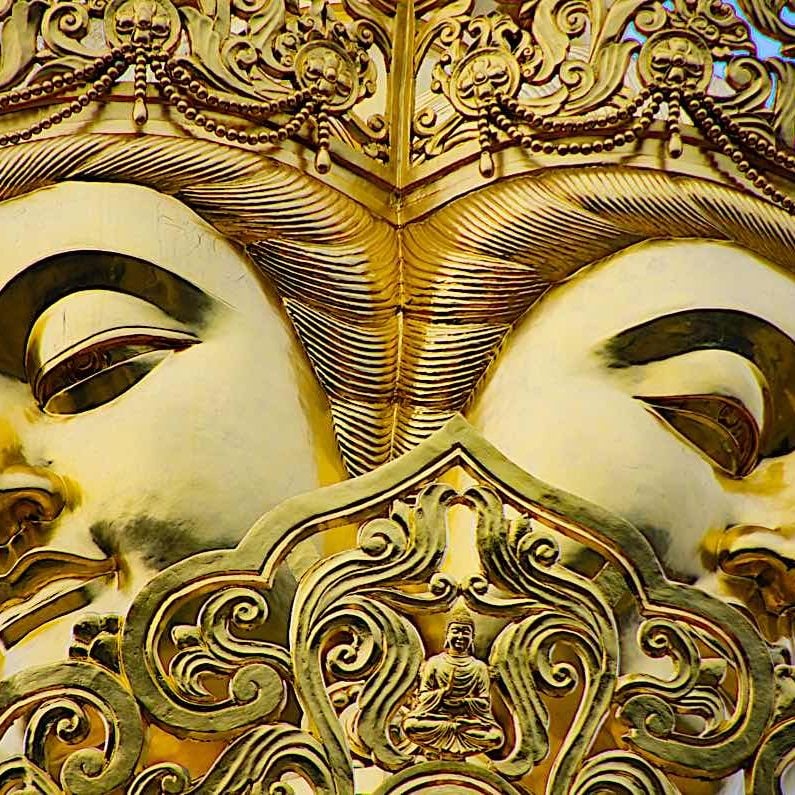
Samantabhadra’s The King of Prayers is the ultimate Buddhist practice how-to and itself a complete practice
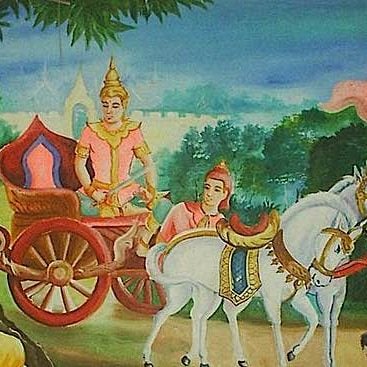
The Five Strengths and Powers or pañcabalā in Buddhism — the qualities conducive to Enlightenment: faith, energy, mindfulness, concentration and wisdom

Tara’s Great Dharani Supreme of all Mantras –with Music version– and the Sutra of Tara Who Protects from the Eight Fears: in Tara’s Own Words
Search
Latest Features
Please support the "Spread the Dharma" mission as one of our heroic Dharma Supporting Members, or with a one-time donation.
Please Help Support the “Spread the Dharma” Mission!

Be a part of the noble mission as a supporting member or a patron, or a volunteer contributor of content.
The power of Dharma to help sentient beings, in part, lies in ensuring access to Buddha’s precious Dharma — the mission of Buddha Weekly. We can’t do it without you!
A non-profit association since 2007, Buddha Weekly published many feature articles, videos, and, podcasts. Please consider supporting the mission to preserve and “Spread the Dharma." Your support as either a patron or a supporting member helps defray the high costs of producing quality Dharma content. Thank you! Learn more here, or become one of our super karma heroes on Patreon.
Lee Kane
Author | Buddha Weekly
Lee Kane is the editor of Buddha Weekly, since 2007. His main focuses as a writer are mindfulness techniques, meditation, Dharma and Sutra commentaries, Buddhist practices, international perspectives and traditions, Vajrayana, Mahayana, Zen. He also covers various events.
Lee also contributes as a writer to various other online magazines and blogs.








